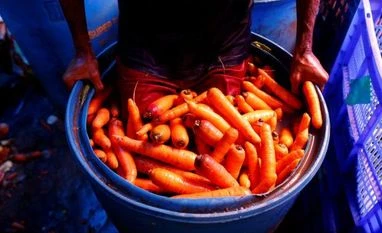An Indian antitrust investigation into suspected price collusion by some prominent global agricultural firms was triggered by farmers who complained about excessive pricing of imported carrot seeds, documents seen by Reuters showed.
A group representing about 1,500 farmers in the mountainous Nilgiri district of Tamil Nadu, a top carrot-growing state in southern India, petitioned the watchdog in 2019 alleging that an "unfair profit margin" was being charged on the carrot seeds, the regulatory documents showed.
This is the first time the complaint is coming into public view. It has touched off an investigation that has the potential to affect pricing practices in an Indian vegetable seed market expected to be worth $1.2 billion in five years.
In some instances, the agricultural firms' seeds were allegedly being sold at four times the imported price, according to the documents. The farmers were also denied sale of such seeds in the northern parts of India where they were available at prices up to 50% cheaper, they alleged, according to the documents.
As part of the investigation, the Competition Commission of India (CCI) conducted a multi-city search and seizure operation on Sept. 8 at the local units of Germany's BASF (BASFn.DE), France's Vilmorin & Cie (VILM.PA) and other firms. The watchdog as a policy does not disclose any ongoing cartel investigations.
"There appears to be an understanding/arrangement between the seed importing companies to control the supply of imported variety of carrot seeds and determine their prices," the CCI said in May last year in a confidential order, in which it asked its investigation unit to look into the matter.
There "appears to be a restriction on dealers not to sell to farmers other than those belonging to a particular region," and the CCI believed "seed companies/distributors/dealers are apparently using their market power" to control demand and supply in the Nilgiris, added the eight-page order.
The subsequent September 2021 raids were conducted at the local units of BASF, Vilmorin's HM Clause, a former distributor entity of Dutch-based Bejo Zaden and some other Indian entities, two people familiar with the operation said.
The investigation could take several months to complete and opens up seed firms and their executives to fines if they are found guilty of violating India's antitrust laws, the sources added.
The CCI did not respond to a request for comment.
BASF spokesperson Úlia de Domènech said in a statement Nunhems India - its vegetable seeds unit which was raided - was committed to complying with Indian laws and was cooperating with all regulators, including the CCI.
A Bejo India official, who declined to be named, said the company sells seeds at same prices to all distributors and in different geographical regions.
Franck Berger, Vilmorin's head of vegetable seeds, told reporters in France last month five companies were raided in India in the case, adding that HM Clause assisted the authorities.
Spokespersons for Bejo and HM Clause did not respond to requests for comment for this story.
CCI's RAID OPERATION
India's vegetable seed market is set to be worth $1.2 billion by 2026, growing 10% a year since 2020, according to research firm Mordor Intelligence. The country is among the top 15 carrot producers in the world, industry estimates show.
The farmers' 2019 complaint cited an example in which an HM Clause's carrot seed variant was allegedly imported at 7,000 rupees ($93.63) per kilogram and sold at four times the price. A similar margin was charged allegedly on a variant of Bejo's seeds.
The farmers also alleged that when they provided positive feedback on the seeds, company dealers jacked up their prices, which were also different across south and north India.
Ahead of ordering the broader investigation, two CCI officials visited the region last year and interviewed farmers and government officials and collected some seed samples from a laboratory, according to a separate internal CCI report. One farmer during that visit showed the CCI a message on his phone to claim prices of same seeds were different in north and south India, the document stated.
The CCI's confidential order noted that as the same type of carrot seed can be used across India, there was "no apparent reason" for selling them at different prices.
During the September raids, data from laptops and smartphones was copied by CCI officials, and some executives were questioned about their practices, the two sources said.
Carrot is a key crop grown in the Nilgiri mountains and R. Rangasamy, president of the complainant farmer group, the Nilgiri Potato & Vegetables Growers Association, told Reuters farmers were suffering due to the high pricing and sale curbs.
"The methodology to fix rates is not transparent ... We are incurring heavy losses because of this randomness," he said.
Unlock 30+ premium stories daily hand-picked by our editors, across devices on browser and app.
Pick your 5 favourite companies, get a daily email with all news updates on them.
Full access to our intuitive epaper - clip, save, share articles from any device; newspaper archives from 2006.
Preferential invites to Business Standard events.
Curated newsletters on markets, personal finance, policy & politics, start-ups, technology, and more.
)